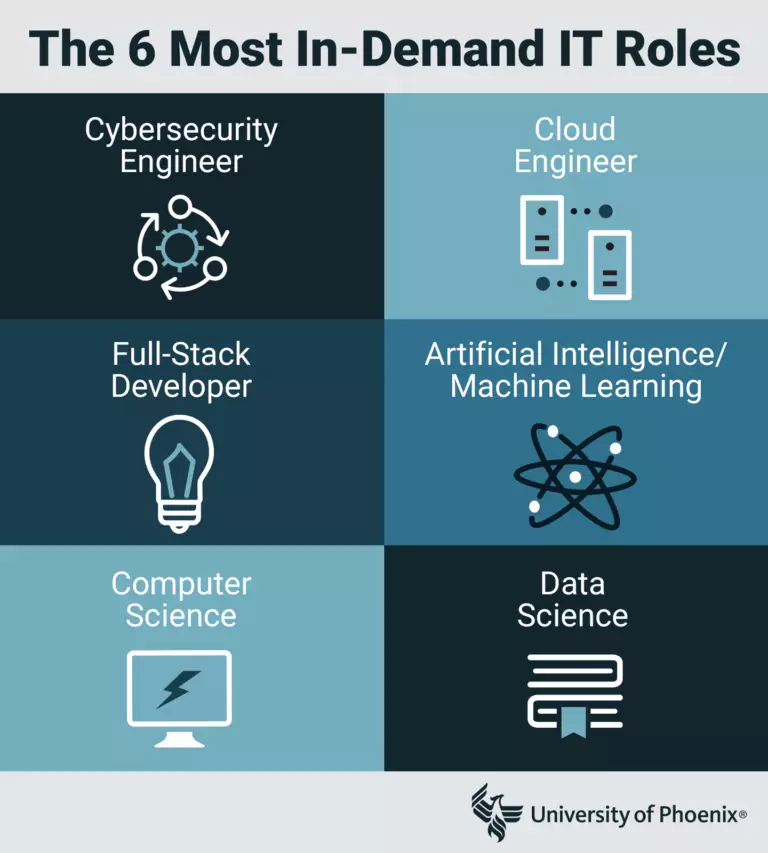In search of: IT skills

Written by Elizabeth Exline

Reviewed by Kathryn Uhles, MIS, MSP, Dean, College of Business and IT
When it comes to understanding which jobs are the most coveted, look no further than your kid’s classroom. Where your classmates back in elementary school might’ve aspired to be basketball players and singers, today’s kids clamor to be YouTube stars and videogame developers when they grow up, all of which points to an uptick in the importance of Information Technology (IT) skills.
Not convinced? Then look instead to the U.S. Bureau of Labor Statistics , which states that IT jobs are projected to grow about 377,500 openings each year from 2022 to 2032.
Or refer to the World Economic Forum (WEF), which cites cloud computing, big data and e-commerce as high priorities for companies, while demand for encryption skills is also spiking.
IT careers, in other words, are the way of the future. Here are the in-demand IT skills you need to succeed.
BLS Occupational Employment Projections, 2022-2032 is published by the U.S. Bureau of Labor Statistics. This data reflects BLS’ projections of national (not local) conditions. These data points are not specific to University of Phoenix students or graduates.
IT skills for tomorrow
IT is an admittedly broad field with sub-specialties that range from computer support to software development . Still, some key skills apply across the industry.
According to Kevin Meylor, Vice President of Application Engineering at University of Phoenix (UOPX), the most important skill, especially in software development, is the ability to quickly learn and implement new things.
“You can call it a growth mindset, but it goes beyond that,” Meylor says. “You need to build the muscle memory of learning new things and applying them to the benefit of [a customer or organization].”
This ability directly feeds the other two in-demand IT skills Meylor recognizes as particularly hot in the field: cloud competency and a coding mindset.
The cloud, Meylor admits, is “a pretty broad umbrella,” which is why being a lifelong learner is so crucial.
“The cloud services that are out there are multiplying like rabbits,” Meylor says. That’s good news for most organizations since data centers are space hogs and expensive to maintain. Leveraging the connectivity and scale of cloud providers just makes sense — and it creates a demand for people who know how to do exactly that.
Coding, meanwhile, is critical for both avoiding and fixing problems. This might mean coding a solution to a bug or building in protections to bolster a company’s cybersecurity.
Steven G. Zylstra, President and CEO of the Arizona Technology Council and SciTech Institute, points out: “Designing security into a product is more advantageous than testing for it after and doing patches and fixes.”
Programming with personality
The other part of IT success hinges on something more ephemeral: the ability to communicate effectively.
“Based on my conversations with employers,” Zylstra says, “technical is easy to teach. Personality is a little bit harder.”
If IT specialists were once considered about as personable as a cactus , times are changing. Zylstra calls the soft skills of collaboration, communication and documentation “power skills” (a phrase he borrowed from a colleague) that are vital to the future of virtually any IT career.
Zylstra explains: “When you enter the workforce, you will most likely be working in teams. You might even work in departments in your organization/company or with other companies. There is a big push to no longer have cybersecurity as a siloed department but a mindset across an entire company. For these reasons, collaboration is key.
“In order for collaboration to happen, you must be an effective communicator — both online and offline. If your company is hacked/breached, it’s imperative that you effectively communicate the problem and solution quickly.
“Part of communication is that you will need to document [problems and protocols] to mitigate future risks/conflicts.”
Putting your skills to work
According to Zylstra, who cites recent data from an advisory council convened by an Arizona university, the most in-demand IT roles and fields include cybersecurity engineer, Cloud engineer, full-stack developer, artificial intelligence/machine learning, computer science and data science.

To this, Zylstra adds, “One of the most in-demand jobs globally is software development [with] an increased focus on secure software development.”
Or, as Meylor puts it, “You cannot get enough software developers.”
Security is a major focus as well, especially considering the recent breaches by foreign bad actors.
Zylstra says: “From the local market, we are hearing strong demand for security-related roles across all domains and fields, including but not limited to cloud security, development security, network security and [operations].”
How to get up to speed
It’s one thing to know where you want to go and what you need to learn. Figuring out the best way to learn it, however, can be less straightforward. Whether you’re already working full-time but need to reskill (or upskill) or are looking to build up your skillset so you can switch careers, some options might include:
- IT Networking: Both UOPX and the Arizona Technology Council are affiliated with Pipeline AZ
. This platform matches users with good career options — and outlines an educational pathway to get there. Get online to see if there are similar organizations in your region.
- Certificates and Certifications: No, these are not the same thing. But strategically pursuing one or some can help distinguish you from other IT professionals in a competitive space.
- IT Degrees: There’s no substitution for a good old-fashioned degree, the ultimate calling card for employers seeking qualified candidates. The difference today, however, is that getting that degree
can happen in a multitude of ways, whether online or in a traditional classroom.
- Professional Development Courses: Similar to a certification course, professional development courses
zero in on the in-demand skills you can immediately apply in the real world.
In addition to these options, Meylor notes that on-the-job experience can count for a lot. And for the autodidacts out there, “you’re never going to beat teaching yourself,” Meylor adds.
What’s more, IT is a field tailor-made to building on what you know. “In tech, it’s really about, ‘How do I build upon that competency?’” Meylor says.
By way of example, he cites one UOPX employee who started his career at the university’s on-site Tech Bar. He took the most entry-level job available, Meylor says, but he was curious and willing to learn. So, UOPX sponsored a boot camp training for him, “and he flourished.” Not even a year later, he’s working as a lead website developer, Meylor says.
All of which goes to show that the field of IT is not just growing. With the right skills, it’s limitless.
Read how one UOPX instructor makes learning IT a labor of love.
From cybersecurity to computer science, IT degrees at UOPX have you covered.

ABOUT THE AUTHOR
Elizabeth Exline has been telling stories ever since she won a writing contest in third grade. She's covered design and architecture, travel, lifestyle content and a host of other topics for national, regional, local and brand publications. Additionally, she's worked in content development for Marriott International and manuscript development for a variety of authors.

ABOUT THE REVIEWER
Currently Dean of the College of Business and Information Technology, Kathryn Uhles has served University of Phoenix in a variety of roles since 2006. Prior to joining University of Phoenix, Kathryn taught fifth grade to underprivileged youth in Phoenix.
This article has been vetted by University of Phoenix's editorial advisory committee.
Read more about our editorial process.
want to read more like this?



